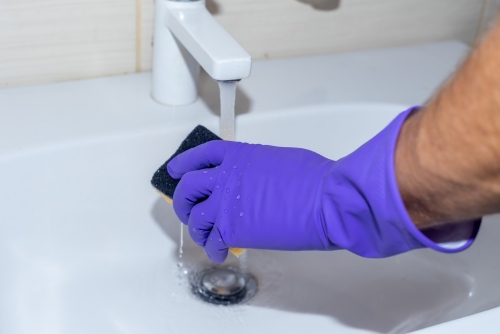
In today's world, disposable gloves have become an essential part of daily life, playing a vital role in protecting our hands from germs, chemicals, and other hazards. But with a variety of options available, navigating the world of disposable gloves can feel overwhelming. Two of the most common choices are Nitrile Gloves and Vinyl Gloves. While both offer hand protection, they cater to different needs and applications. This comprehensive guide, updated for 2024, delves into the key features of nitrile and vinyl gloves, helping you choose the perfect pair for every task.
Understanding Latex Free Nitrile Gloves: Strength and Resilience
Nitrile gloves are a versatile and popular choice, prized for their durability, puncture resistance, and chemical resistance. Made from synthetic nitrile rubber, these gloves offer a strong barrier against a wide range of chemicals, oils, and other hazardous materials.
Key Features of Nitrile Gloves:
- Superior Durability and Puncture Resistance: Nitrile's inherent strength makes it ideal for tasks with a high risk of punctures or tears. Mechanics, laboratory technicians, and anyone handling sharp objects can benefit from the added protection nitrile gloves provide. Did you know? A study by the American Society for Testing and Materials (ASTM) found that nitrile gloves can withstand up to three times the puncture force compared to vinyl gloves.
- Excellent Chemical Resistance: Nitrile gloves offer superior chemical resistance compared to vinyl gloves. They can effectively shield your hands from exposure to a variety of chemicals, including acids, alcohols, oils, and greases.
- Enhanced Tactile Sensitivity and Dexterity: Despite their strength, nitrile gloves maintain a good degree of tactile sensitivity. This allows for better finger dexterity and control when handling delicate objects or performing intricate tasks.
- Latex- and Powder-Free Options Available: For those with latex allergies, nitrile gloves offer a safe and effective alternative. Additionally, powder-free nitrile gloves minimize the risk of airborne allergens and potential contamination in sensitive environments.

Exploring Vinyl Gloves: Affordability and Convenience
Vinyl gloves are a cost-effective option for low-risk environments. Made from polyvinyl chloride (PVC), these gloves provide a basic barrier against dust, dirt, and some mild chemicals.
Key Features of Vinyl Gloves:
- Cost-Effective and Budget-Friendly: Vinyl gloves are generally less expensive than nitrile gloves, making them a suitable choice for tasks where frequent glove changes are necessary or high durability isn't a primary concern.
- Comfortable and Flexible for Everyday Use: Vinyl gloves offer a comfortable and flexible fit, ideal for short-term wear or tasks that don't involve harsh chemicals.
- Limited Chemical Resistance: While vinyl gloves offer some protection against mild chemicals, they are not recommended for handling strong chemicals or hazardous materials.

Nitrile vs. Vinyl Gloves: Selecting the Right Disposable Gloves
Choosing between nitrile and vinyl gloves boils down to understanding the specific needs of your task. Here are some key factors to consider.
What is the risk level of the task?
- High-Risk vs. Low-Risk Environments: For high-risk situations involving bodily fluids, hazardous chemicals, or sharp objects, nitrile gloves are the clear winner due to their superior puncture resistance and chemical protection. In low-risk environments like food handling or light cleaning, vinyl gloves may suffice.
- Durability Needs (Extended Wear vs. Short-Term Use): For extended wear or tasks with a high risk of punctures or tears, nitrile gloves offer superior durability. Vinyl gloves might be suitable for short-term use or frequent glove changes.
- Chemical Exposure Potential: If you are handling harsh chemicals, oils, or greases, nitrile gloves are essential for their superior chemical resistance. Vinyl gloves offer minimal protection against such hazards.
- Tactile Sensitivity Requirements (Dexterity vs. Basic Protection): For tasks requiring good finger dexterity and control, nitrile gloves provide a better balance between protection and tactile sensitivity. Vinyl gloves, while comfortable, may limit dexterity slightly.
- Do you have a Latex Allergy? Nitrile gloves are an excellent alternative for those with latex allergies.
- Cost Considerations: Vinyl gloves are generally more affordable, making them a good choice for low-risk tasks or situations where frequent glove changes are required. Nitrile gloves offer a higher level of protection but come at a slightly higher cost.
When to Choose Nitrile Gloves:
- High-risk situations and bodily fluids (medical professions, tattooing)
- Working with harsh chemicals and oils (mechanics, industrial cleaning)
- Extended wear needs and durability (laboratory work, automotive repairs)
- Tasks requiring good tactile sensitivity and dexterity (electronics assembly, jewelry making)
- Latex allergies
When to Choose Vinyl Gloves:
- Low-risk tasks and food handling (grocery stores, food preparation)
- Short-term use and frequent glove changes (painting, hairdressing)
- Budget-conscious needs (non-critical tasks, occasional use)

Beyond the Basics: Additional Considerations for Healthcare
- Sterile vs. Non-Sterile Gloves: Sterile gloves are essential in medical settings where maintaining a sterile environment is crucial. Both nitrile and vinyl gloves can be available in sterile options.
- Glove Liners: For added comfort and protection under nitrile gloves, consider using glove liners. These thin, often cotton or synthetic liners help absorb sweat and reduce the risk of skin irritation during extended wear.
- Glove Powder: While some vinyl gloves come powdered for easier donning, powdered gloves can be a source of airborne allergens and may not be suitable for all environments. Powder-free options are generally preferred.
- Ambidextrous vs. Handed Gloves: Ambidextrous gloves can be worn on either hand, offering convenience and cost savings. However, handed gloves provide a better fit and may enhance dexterity.
- Cuff Styles: Nitrile and vinyl gloves come in various cuff styles, including beaded cuffs for added strength and tear resistance and rolled cuffs for a more comfortable fit.
Nitrile vs. Vinyl Gloves: A Summary Table
| Feature | Nitrile Gloves | Vinyl Gloves |
|---|---|---|
| Material | Synthetic nitrile rubber | Polyvinyl chloride (PVC) |
| Durability | Excellent | Good for short-term wear |
| Puncture Resistance | Superior | Moderate |
| Chemical Resistance | Excellent | Limited |
| Tactile Sensitivity | Good | Moderate |
| Latex-Free | Yes | Yes |
| Cost | More expensive | More affordable |
| Ideal Uses | High-risk environments, chemical handling, extended wear, and dexterity required | Low-risk environments, food handling, and short-term use |
Making an Informed Choice
While this guide focused on Nitrile and Vinyl gloves, there's a wider world of hand protection options to explore. If you're looking for medical exam gloves for a doctor's appointment or at-home medical needs, nitrile or latex gloves are common choices. For household cleaning, disposable vinyl or nitrile gloves offer a good balance of protection and affordability. Home Depot and other hardware stores often carry a variety of gloves, including chemical-resistant gloves for tougher tasks. If you're a professional needing PPE (Personal Protective Equipment), explore options beyond gloves, like safety glasses and respirators. For browsing online retailers like Winsham Fabrik, Staples, and Amazon.ca, consider searching by material (nitrile, latex), mil thickness, or brand names like Framar. Remember, gift cards can be a great way to save on these purchases!
By understanding the key differences between nitrile and vinyl gloves, you can make an informed decision about which option best suits your needs. Remember, the best gloves prioritize both safety and comfort. For high-risk environments, extensive chemical exposure, or tasks requiring dexterity, nitrile gloves offer superior protection. For low-risk tasks or situations where frequent glove changes are necessary, vinyl gloves may be a suitable and cost-effective alternative.

Additional Tips for Choosing the Right Gloves:
- Consider the size: Gloves should fit snugly but allow for some movement. Avoid overly loose or tight-fitting gloves.
- Think about comfort: Opt for gloves made from breathable materials, especially for extended wear.
- Read the labels: Pay attention to the glove's intended use, material composition, and any relevant certifications.
- Don't hesitate to consult a professional: If you're unsure about which gloves are right for your specific needs, consult a safety expert or healthcare professional for guidance.
By following these tips and utilizing the information provided, you can confidently choose the perfect pair of nitrile or vinyl gloves for any task, ensuring optimal hand protection and safety.ami
FAQ
Which is more durable, nitrile gloves or vinyl gloves?
Nitrile gloves are significantly more durable than vinyl gloves. Nitrile's inherent strength allows it to withstand punctures and tears much better than vinyl. Imagine vinyl gloves as a thin, protective layer, similar to a plastic bag. Nitrile gloves, on the other hand, are like a sturdier, more robust layer, similar to a thick rubber band. This analogy highlights the difference in durability between the two materials.
What are the advantages and disadvantages of nitrile gloves?
Advantages:
- Superior durability and puncture resistance
- Excellent chemical resistance
- Enhanced tactile sensitivity and dexterity compared to vinyl
- Latex-free and powder-free options are available
Disadvantages:
- Slightly more expensive than vinyl gloves
- May not be as comfortable for extended wear as vinyl gloves (due to their tighter fit)
Choosing the Right Size Nitrile Gloves: Perfect Fit for Every Hand
Finding the right size nitrile gloves is crucial for both comfort and protection. Gloves that are too loose can snag or bunch, compromising dexterity. Gloves that are too tight can restrict blood flow and cause discomfort. Here's a guide to choosing the right size nitrile gloves:
- Measure your hand: Measure the widest part of your hand (across the palm) and your hand length (from the tip of your middle finger to your wrist crease).
- Refer to a size chart: Most nitrile glove manufacturers provide size charts that correlate hand measurements with glove sizes (e.g., small, medium, large).
- Consider the intended use: If you require maximum dexterity for intricate tasks, you might opt for a slightly snugger fit. However, for extended wear, a slightly looser fit might be more comfortable.
Do nitrile gloves expire? Proper Storage Tips for Long-Lasting Gloves
Nitrile gloves themselves don't have a specific expiration date. However, their performance can degrade over time due to factors like exposure to sunlight, extreme temperatures, or improper storage. Here are some tips for storing nitrile gloves to ensure optimal performance and longevity:
- Store in a cool, dry place: Avoid extreme temperatures, both hot and cold.
- Keep away from direct sunlight: Sunlight can degrade the material of the gloves.
- Store in their original packaging: The original packaging often helps protect the gloves from dust and other contaminants.
- Avoid crushing or folding: This can weaken the material and increase the risk of tears.
Can I reuse nitrile or vinyl gloves?
Generally, it's not recommended to reuse disposable gloves. Both nitrile and vinyl gloves are designed for single use to maintain optimal protection. However, if minimal contamination is involved and the gloves remain intact, you may be able to reuse them for short, non-critical tasks at your discretion.
Are nitrile gloves stronger than vinyl gloves?
Yes, nitrile gloves are significantly stronger than vinyl gloves. Think of it like this: Imagine vinyl gloves as a thin, protective layer, similar to a plastic bag. Nitrile gloves, on the other hand, are like a sturdier, more robust layer, similar to a thick rubber band. This analogy highlights the difference in puncture resistance between the two materials.
Can I use vinyl gloves with bleach?
No, vinyl gloves are not recommended for use with bleach or other harsh chemicals. Bleach can degrade vinyl, potentially compromising the glove's integrity and increasing the risk of exposure. For tasks involving bleach or harsh chemicals, always opt for nitrile gloves due to their superior chemical resistance.
By following these storage tips, you can extend the lifespan of your nitrile gloves and ensure they provide adequate protection when needed.
By understanding the key differences between nitrile gloves and vinyl gloves, and considering the factors mentioned above, you can confidently choose the perfect pair for your specific needs. Remember, the best gloves prioritize both safety and comfort.

Stay Safe, Stay Protected: Find the Perfect Gloves for You!
Now that you're armed with the knowledge to differentiate between nitrile gloves and vinyl gloves, browse our extensive selection to find the perfect pair for your needs! We offer a variety of sizes, thicknesses, and features to ensure optimal hand protection in any situation.
Shop Nitrile Gloves Now!
Shop Vinyl Gloves Now!
Have lingering questions? Our friendly customer service team is happy to help! Contact us today or visit our Help Center for additional information.

